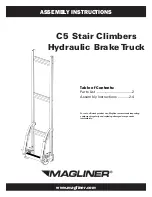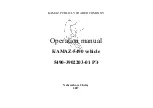
A03048
General Safety & Operation
A3-31
TOWING
Before towing a truck, many factors must be
carefully considered. Serious personal injury
and/or significant property damage may result if
important safety practices, procedures and
preparation for moving heavy equipment are not
observed.
A disabled machine may be towed after the following
precautions have been taken.
• Do not tow the truck any faster than 8 kph (5
mph).
• Tow with a solid tow bar. DO NOT tow with a
cable. Use a towing device with ample strength
for the weight of this truck.
• Never tow a truck on a slope.
• Inspect towing components, such as tow bars
and couplings, for any signs of damage. Never
use damaged or worn components to tow a
disabled vehicle.
• Keep a safe distance from the trucks and towing
apparatus while towing a vehicle.
• AFTER connecting a truck that is to be towed,
DO NOT allow anyone to go between the tow
vehicle and the disabled vehicle.
• Set the coupling of the truck being towed in a
straight line with the towing portion of the tow
truck, and secure it in position.
• An operator is to remain in the cab of the towed
vehicle at all times during the towing procedure.
Towing Procedure
1. Shut the engine off.
2. Block the wheels on the disabled truck to
prevent movement while preparing the truck for
towing and while attaching the tow bar.
3.
Ensure the towing vehicle has adequate
capacity to both move and stop the towed truck
under all conditions.
4. Ensure that the tow bar has adequate strength
(approximately 1.5 times the empty vehicle
weight of truck being towed). Install tow bar
between the two vehicles.
5. Block the wheels on the tow vehicle to prevent
movement while preparing the disabled truck for
towing.
6. If necessary, install quick disconnect fittings to
the bleeddown manifold to allow the hydraulic
system to be operational. Install hydraulic
connections for steering/braking between the
tow vehicle the and disabled vehicle. An
auxiliary power unit can also be used.
7. After the hydraulic connections are made,
check the disabled vehicle braking and steering
systems for normal operation. Install 24 100
kPa (3,500 psi) pressure gauges on both the BF
test port and the BR test port on the brake
manifold in the brake cabinet. Ensure proper
pressure is displayed on the gauge when
depressing the brake pedal.
8. If the truck is loaded, dump the entire load.
Never pull or tow a loaded truck. Refer to
“Disabled Truck Dumping Procedure”.
9. Ensure the operator in the towing vehicle has 2-
way radio communications with the driver in the
disabled truck.
10. When ready to tow the disabled truck, remove
blocking from the wheels.
11. Tow the disabled truck. Sudden movement may
cause tow bar failure. Smooth, gradual truck
movement is preferred. Do not tow the truck
any faster than 8 kph (5 mph).
12. Minimize the tow angle at all times.
Never
exceed 30 degrees.
The towed truck must be
steered in the direction of the tow bar.
13. When the desired location has been reached,
the operator in the towed vehicle is to apply the
service brakes, then apply the parking brakes.
14. Block the wheels on the towing vehicle and the
disabled truck to prevent roll-away.
15. Shut down the engine in the towing vehicle.
Disconnect the hydraulic hoses.
16. Disconnect the tow bar.
Summary of Contents for 730E
Page 2: ...Find manuals at https best manuals com ...
Page 8: ...A 4 Introduction A00044 KOMATSU MODEL 730E DUMP TRUCK Find manuals at https best manuals com ...
Page 10: ...A1 2 Index 8 10 A01001 NOTES Find manuals at https best manuals com ...
Page 48: ...A3 34 General Safety Operation A03048 NOTES ...
Page 51: ...This as a preview PDF file from best manuals com Download full PDF manual at best manuals com ...





























